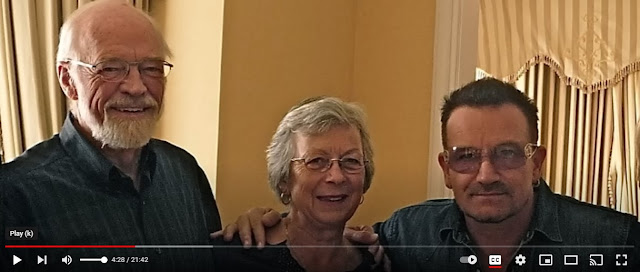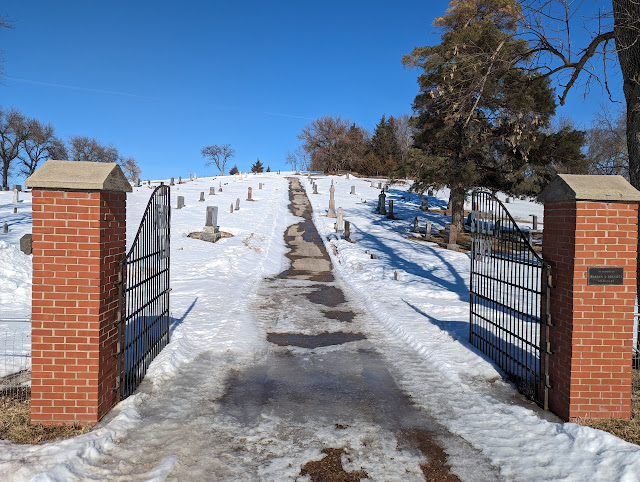 |
| The Petersons and Bono |
The man's knowledge of the Bible was absolutely exhaustive. No one can plumb scripture's depths fully, but Eugene Peterson had gone through it, word by word, to create a new translation in an attempt to catch the Bible's wondrous exuberance, its very life. Thousands--well, 17 million around the world--were greatly pleased by The Message.
One of those readers called Eugene and Jan one day, a man who apparently had only one name, a man who introduced himself as Bono from a music group called U2. The name rang a bell--Eugene had been told by his students that Bono had mentioned him in an interview in Rolling Stone. But did they know this man?--hardly--they barely knew of him. And then this Bono fellow told them he'd like to talk to them and have them as special guests at a concert of his.
First, Eugene turned him down, actually turned him down. He had deadlines, after all. . .
When Bono tried again, he told them he'd fly them down to Dallas, where U2 was performing, because he'd like to spend some time with them. He'd read The Message and wanted to talk about it and to thank the Petersons, personally, for doing it.
This time they consented. I heard the story from the Petersons when they told it at a small gathering of writers, told it with sheer joy coupled with some significant helpings of embarrassment that they really hadn't heard much about this man with the single name, didn't recognize him, and, they admitted, didn't spend much time at all with Bono's own special brand of contemporary music.
Let me just add that Eugene Peterson, a man who sold millions of books, was accomplished at humility. The real story of the Petersons and Bono was, to them, how absurdly unprepared they were to understand what was going on around them--Montana Yankees in King Bono's Court. It was a hoot.
In fact, they said, to say they enjoyed the concert would be stretching truth, although once they'd begun to listen a bit to U2, they said, they'd grown in appreciation. But the concert was really loud, much louder than the classical stuff that played at their cabin in the Montana mountains.
To be sure, Bono himself they loved. They enjoyed him, were impressed by his candor about faith, by his commitment. By the time they got on a plane for Dallas, they knew that in a world larger than their own, Bono was a celebrity for all kinds of good reasons.
I was a part of this small group of writers, the Chrysostom Society, for 20 years maybe, but the night that the Petersons gleefully told the story about their trip to a Bono concert the whole bunch of us were in stitches. The story--and their telling of it-- was both hilarious and sweet, and a comfort really, the faith of the giant rocker itself a testimony of grace.
The new Christianity Today (March, 2023) arrived in the mailbox yesterday. I must admit I didn't read much of the December, 2022 issue, which featured an interview with Bono. But in a short piece introducing the letters the magazine received, senior editor Kate Lucky claims "Some readers expressed gratitude for the rocker's reflections, reminiscing about how his music shaped their faith through car radios and stadium concerts. Then she quoted from a reader who said he admired Bono's "hope in Christ" and "how [Bono] considers himself a pilgrim. . .rather than someone who considers himself to have arrived."
But there were other letters too, she explained: ". . .several readers . . .were troubled by the profile's omissions--mostly Bono's positions on abortion and LGBT issues." Apparently, those readers have arrived.
It seems to me that it was Ann Lamott who said, the opposite of faith is certitude.
Is it any wonder why people leave a church that can't begin to reconcile its own?
___________________
A twenty-minute video about the Petersons visit with Bono is worth watching if you don't know the story.














